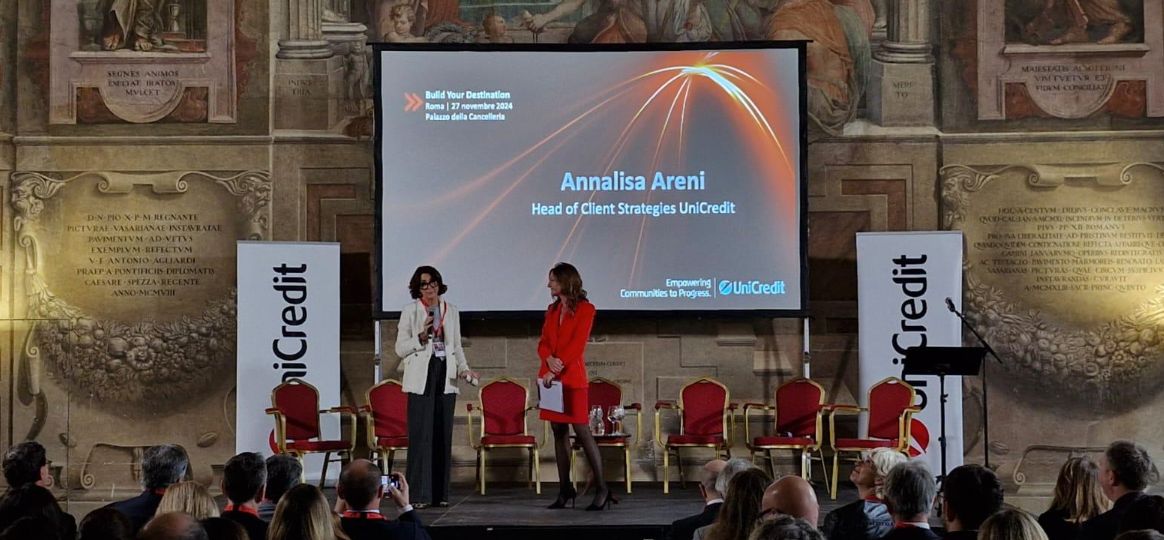ROME (ITALPRESS) – Italy is the second largest country in the EU in terms of foreign visitors and the third largest in terms of overall tourist arrivals. A good placement that, however, hides a trend of tendential weakness in domestic demand, offset by foreign demand. This industry, if done in an inclusive way, can become an engine of economic growth for local communities, generating new job opportunities and stimulating exports even in inland areas. This is what emerged from the forum “UniCredit – Build your Destination,” the meeting dedicated to the tourism supply chain that took place today in Rome, at the Palazzo della Cancelleria.The direct impact of the tourism sector is estimated by Istat at 6.2 percent of the added value of the economy, but the total weight (between direct, indirect and induced) doubles this value, with figures that, for 2023, range between 10 and 14 percent of GDP. “The tourism sector is a fundamental pillar of the Italian economy and generates a significant impact on national GDP. It is essential to continue investing in the supply chain, through the development of strategies aimed at fostering sustainable growth of territories and local communities. From this perspective, synergistic collaboration between businesses, stakeholders and public and private institutions assumes crucial relevance to increase the attractiveness of our country,” explained Annalisa Areni, Head of Client Strategies UniCredit. “UniCredit is strongly committed to supporting companies in the sector through dedicated solutions and initiatives, as demonstrated by the two editions of the Made4Italy program and the UniCredit for Italy plan. “From the Industry Book on the UniCredit Tourism Supply Chain, presented by Sonia Taraschi, Advisory Board & Territorial Plans UniCredit, it emerged how tourism demand over the decades has shown a continuously growing trend. The only real shock was the covid-19 from which international flows have recovered to date, with different dynamics among world areas. Looking at the direct impact and the sectors that make up the supply chain, UniCredit built a model with Prometeia based on the balance sheets of 79,000 capital firms without size constraints to understand how the sector moved before, during and after covid and what is expected for 2024-2026. The analysis shows how the dynamics of output of tourism enterprises in the pre-covid period, net of inflationary dynamics, showed a significantly more buoyant trend than both the Italian economy as a whole. Although severely affected in the covid phase, the tourism industry showed a quick recovery, returning to levels above those that characterized the pre-pandemic period. The model’s forecasts outline a continuation of the growth phase of the tourism industry in the coming years, at rates that, while physiologically less lively than post covid, remain higher than the total economy, confirming the importance of the sector for the Italian production system. Over the period 2024-2026, the total number of capital firms active in the tourism supply chain is expected to record increases in turnover net of inflation of more than 3 percent per year on average, with all sectors growing more briskly than the total economy.Maria Elena Rossi, Enit Global Marketing and Promotion Director, then outlined the latest data on the sector, according to which “in the period January-August 2024, Italy will record 38.5 billion euros in revenue from international tourism and 23 billion euros in consumption by Italians abroad, for a positive tourism balance of 15.5 billion euros.” The Enit report highlighted a number of issues, including the skills gap, new trends in ESG-sensitive tourism and major events such as the Jubilee, which inspired the panel discussion moderated by journalist Janina Landau. According to Marina Lalli, president of Federturismo, “the way of traveling has changed and, as a result, the way territories promote themselves must also change. In Italy we are able to offer varied trips and experiences, but we can do better,” especially in managing tourist flows. For Walter Pecoraro, president of Federalberghi Lazio, “the Jubilee will bring tourism flows” not only to Rome, but throughout Italy, “even in the years to follow. We hope that these events will have a positive spin-off, we try to work to ensure that institutions are sensitive to the issues that customers highlight to us. “Marco Brogna, president ITS Turismo Academy Lazio, stressed the importance of training. “Tourism changes with extreme rapidity, we need to offer new professions necessary for tourism entrepreneurship: the quality of the tourism product is made by those who work in it, we need very high quality and professionalism.” Giampaolo Letta, president ADB Centro UniCredit, also pointed out that training is among the central issues. “Speaking of tourism promotion, one element that has enormous value is precisely training: finding welcoming people is the first factor in promoting an area” to “achieve a multiplier effect.” The audiovisual sector, with cinema and TV series, “is also a very strong tool for tourism promotion, especially for destinations that are not well known.” Onorio Rebecchini, president of Convention Bureau Roma e Lazio, highlighted the importance of the meetings and large convention events sector in revitalizing some destinations. “Italy is the leading country in this market segment: synergies with public administrations and the support of economic operators such as Unicredit are fundamental.” Just as, added Luisella Altare, Head of Corporate Italy at UniCredit, “proximity, understanding, listening and expertise, even within the bank, are fundamental.” For example, “experiential tourism is having a great development, especially in small villages” and “is giving us back a great opportunity to invest in a different way,” she explained. “UniCredit is proud to have hosted the tourism forum in Rome, an important opportunity to reflect on the development prospects of the supply chain. Tourism is a driving sector of the economy of this area, and the upcoming Jubilee of 2025 can offer a further propulsive boost to the sector,” concluded Roberto Fiorini, Regional Manager Region Central Italy UniCredit. “We accompany businesses in overcoming challenges related to ecological and digital transitions, creating sustainable development opportunities for the territory and communities.”-photo Unicredit press office-(ITALPRESS)

